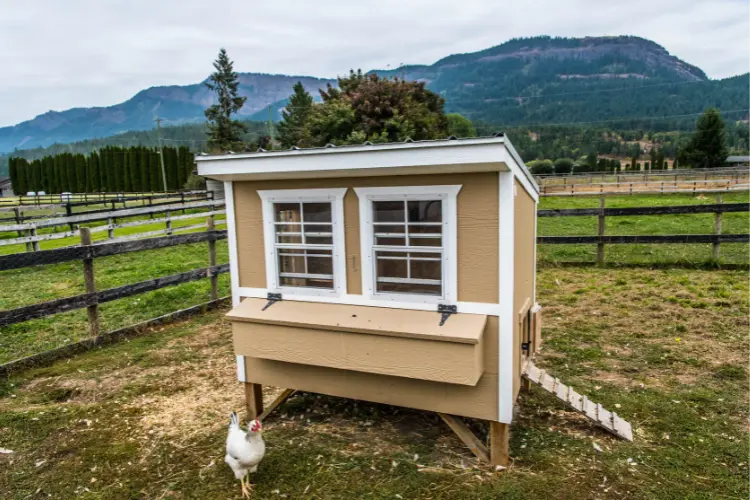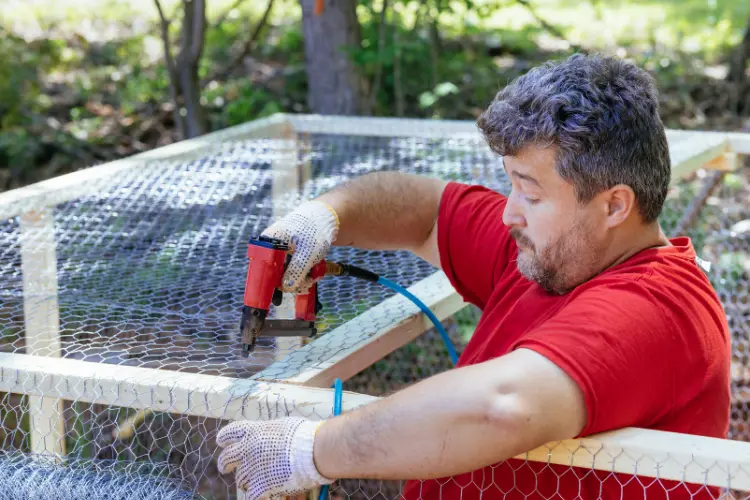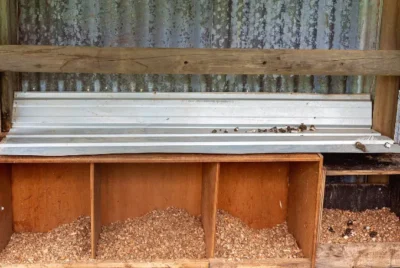Is It Cheaper to Buy or Build a Chicken Coop? 2023 Edition
Are you considering getting into backyard chicken farming in 2023 and wondering whether it’s more cost-effective to buy a pre-made chicken coop or embark on the DIY route?
In this blog post, I will discuss if it is cheaper to buy or build a chicken coop. I will delve into the financial aspects of both options to help you navigate the complexities of poultry housing decisions.
So, if you’re feeling the pinch in your wallet or simply want to make the most economical choice for your feathered friends, keep reading to uncover the answers to your coop conundrum and find the perfect coop for your flock!
Cost Comparison: Buying vs. Building a Chicken Coop
One of the most significant factors when deciding between a pre-built chicken coop and building one yourself is the cost. Generally speaking, building a chicken coop can save you about half the cost of purchasing a pre-built coop. Pre-built chicken coops can range from $300 to $2,000, with the national average being $650.
On the other hand, constructing a chicken coop typically has a chicken coop cost ranging between $300 and $2,000, with the national average being approximately $650. The most substantial outlays for any quality chicken coop are:
- Expansive flat surfaces
- Floor
- Walls
- Roof

Pre-built Chicken Coop Costs
Pre-built chicken coops come in a wide price range, from $200 to $7,700, depending on size, materials, and features. For example, the Cumberland Cottage Chicken Coop at Tractor Supply is priced at $299, while the Amish Chicken Coop from Green Garden Chicken.com, built with quality materials such as 2 x 4’s and 4 x 4’s for the base, radiant barrier sheathing on the roof, and weather-resistant exterior siding, costs $1534.
Although pre-built coops offer convenience, you should weigh the additional cost against potential limitations in customization and personalization.
DIY Chicken Coop Costs
Constructing a DIY chicken coop can be more affordable, ranging from $100 to $2,000. Savings on labor costs and the ability to choose materials and design make DIY coops an attractive choice for many chicken keepers.
For example, the cost range for a basic A-frame quarantine coop is between $200 and $300. A walk-in chicken coop, on the other hand, has an average cost of $650.
Building your own chicken coop allows the use of premium materials, such as chicken wire, and the potential to save money through recycled or free materials, further reducing costs.
If you want to buy a durable and protective hardware cloth for your DIY chicken coop project, you can check the Land Guard 19 Gauge Hardware Cloth. Your chickens will thank you for the added security and comfort.

Customization and Personalization
When it comes to making your chicken coop uniquely yours, customization and personalization play a significant role. Pre-built chicken coops come with a set design, features, and materials, whereas DIY chicken coops offer the flexibility to create a custom space tailored to your individual needs and preferences.

Pre-built Chicken Coop Limitations
Although pre-built chicken coops offer convenience, they may not provide the customization options you desire, especially if you’re looking for a small chicken coop. That’s why a custom-built chicken coop can be a better choice, as pre-built, small chicken coops will typically offer limited customization options, such as size, shape, and color.
Furthermore, pre-built coops may not be entirely suitable for your specific needs or property. Also, pre-built coops generally utilize lower-quality materials compared to those used in DIY chicken coops.
As a result, you may find yourself compromising on the quality and design of your chicken coop if you opt for your first coop from a pre-built option.
If you’re in search of the ideal coop for a specific number of hens, check out our review on the Best Chicken Coop for 10 Chickens. It provides comprehensive details to help you make an informed choice without compromise.
DIY Chicken Coop Flexibility
In contrast, DIY chicken coops provide flexibility in terms of design, materials, and features, allowing you to create a personalized and functional coop. Building your own chicken coop enables you to select materials and invest where necessary, as well as incorporate unique features tailored to your flock’s needs.
Bear in mind, constructing a DIY chicken coop demands more time and effort. Your choice between a pre-built and DIY chicken coop ultimately depends on your personal preference, budget, and the amount of time and effort you intend to invest.
Read also: How to Build a Chicken Coop: A Step-by-Step Guide
Time and Effort Considerations
The time and effort required to set up a chicken coop is another essential factor to consider. Whether you purchase a pre-built chicken coop or decide to build one yourself, each option has its own set of challenges and rewards.

Buying a Pre-built Chicken Coop
Purchasing a pre-built chicken coop can save you time and effort, as it eliminates the need for planning, construction, and customization.
Even pre-built coops, however, may necessitate some assembly and additional customization to accommodate your individual needs and preferences. A chicken coop kit can be a great solution for this purpose.
Assembling a pre-built chicken coop may necessitate a certain level of expertise and familiarity with carpentry and construction. Understanding the required skills and experience for pre-built coops is therefore crucial.
Building a DIY Chicken Coop
On the other hand, building a DIY chicken coop requires a significant amount of time and effort, including planning, construction, and customization stages.
The duration of constructing a DIY chicken coop can range from one day to several weekends, depending on the size and complexity of the design, as well as your proficiency.
Building your own coop with a DIY approach lets you create a unique and functional home for your chickens, but it’s important to evaluate whether you possess the needed carpentry skills, tools, and experience for a successful project.
Skill Level and Experience
When deciding between a pre-built or DIY chicken coop, it’s important to consider your skill level and experience. Both options require some expertise in carpentry and construction.

Pre-built Chicken Coop Requirements
Pre-built chicken coops require minimal skills and experience, making them suitable for beginners. Assembling a pre-built coop necessitates a certain level of expertise and comprehension of carpentry and construction, including basic woodworking abilities and an adequate understanding of tools and measurements.
If you’re new to chicken keeping or don’t have much experience with construction, a pre-built chicken coop may be the right choice for your first chicken coop.
DIY Chicken Coop Construction Skills
In contrast, constructing a DIY chicken house or coop requires carpentry skills, tools, and experience for a successful outcome. Building a DIY coop necessitates some proficiency and familiarity with carpentry and construction, including basic woodworking skills and a thorough comprehension of tools and materials.
If you have prior experience with carpentry or enjoy DIY projects, learning how to build a chicken coop can be a rewarding endeavor, especially when you end up with a beautiful coop or a chicken coop built as your own chicken coop.
Read also: How to Build a Chicken Coop from a Shed in 2023
Longevity and Maintenance
Another crucial factor to consider when choosing between a pre-built and DIY chicken coop is the longevity and maintenance requirements. A well-built chicken coop should provide a safe and comfortable home for your chickens for many years.
Pre-built Chicken Coop Durability
The durability of pre-built chicken coops may vary depending on the materials used and the quality of construction. Pre-built chicken coops are expected to have a lifespan of 10-15 years with appropriate upkeep.
Routine maintenance is necessary for pre-constructed chicken coops, including cleaning, assessing for structural damage, and substituting components as required. Considering the durability and maintenance requirements of pre-built coops is vital when making your decision.
DIY Chicken Coop Longevity
DIY chicken coops can be constructed with longevity as a priority, utilizing sturdy materials and correct construction techniques. A well-built DIY chicken coop can last up to 20 years when maintained correctly.
Regular maintenance is essential for DIY chicken coops, including cleaning, assessing for structural damage, and replacing components as required. By building your own chicken coop, you have the opportunity to create a durable and long-lasting home for your chickens.
Environmental Impact and Sustainability
Raising chickens can have a positive impact on the environment by promoting self-sufficiency, reducing greenhouse gas emissions and energy use, and providing compost. One must also consider the environmental impact and sustainability of the chicken coop itself.

Pre-built Chicken Coop Environmental Impact
Pre-built chicken coops have a beneficial environmental impact in comparison to factory farming. They advocate for backyard chicken keeping, which is more efficient and generates less waste. Cultivating chickens in pre-built coops also reduces the carbon footprint by evading the environmental impact of factory farming.
Furthermore, recycling and reusing materials in constructing and equipping the coops further reduces their environmental impact. However, the materials used in pre-built coops and their transportation may have a higher environmental impact than DIY coops.
DIY Chicken Coop Sustainability
DIY chicken coops can have a beneficial environmental effect if they are constructed with sustainable materials and techniques. Building a DIY chicken coop with recycled materials and utilizing renewable energy sources can diminish the environmental effect of the coop.
Additionally, DIY chicken coops can be fashioned to be more energy efficient than pre-built coops. By constructing your own chicken coop with sustainability in mind, you can contribute to a more environmentally friendly and sustainable approach to raising chickens.
Final Thoughts
So, which option is cheaper in 2023: buying or building a chicken coop? The answer depends on your specific circumstances and priorities.
If you value convenience, have a busy schedule, and are willing to invest in a ready-made solution, buying a chicken coop may be the way to go. However, be prepared to pay a higher upfront cost.
On the other hand, if you enjoy DIY projects, have some carpentry skills, and want a coop tailored to your exact needs, building your own chicken coop can be a cost-effective and rewarding choice. Just remember that it will require more time and effort.
Ultimately, the decision comes down to your budget, available time, and personal preferences. Whichever route you choose, ensuring the comfort and safety of your chickens should be your top priority. Happy chicken-keeping in 2023!
For more tips, tricks, and articles on raising chickens and creating the perfect coop, visit our website’s dedicated chicken-raising section. We’re here to help you become a successful and happy chicken owner.




